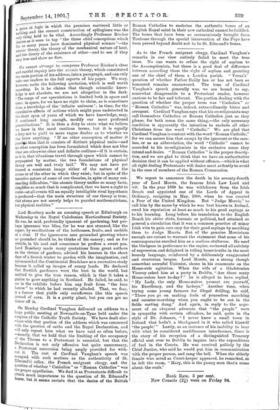ice cannot -attempt to compress Professor Riicker's close an a car eful
inquiry into the atomic theory, which constituted the main portion of his address, into a paragraph, and can only refer our readers to the full reports of his paper. We may, however, make the following quotation, which is well worth recording. In it he claims that though scientific= brow- ledge is not absolute, we are not altogether in the dark. The range of our speculations is limited both in space and time in space, for we have no right to claim, as is sometimes done, a knowledge of the infinite universe ' ; in time, for the cumulative effects of actions which might pass undetected in the short span of years of which we have knowledge, may, if continued long enough, modify our most profound generalisations." It is thus a duty to state what we believe we know in the most cautious terms, but it is eqpally a duty not to yield to mere, vague doubts as to whether we know anything. "If no other conception of matter 18 podia than that. it consists of distinct physical units—and no other conception has been formulated which does not blur what are otherwise clear and definite outlines—if it is certain, as it is, that vibrations travel through space which cannot be propagated by matter, the two foundations of physical theory are well and - truly laid." We may not have yet framed a consistent image either of the nature of the atoms or of the ether in which they exist; but in spite of the tentative nature of some of :our theories, in spite of many out- standing difficulties, "the atomic theory unifies so many facts, simplifies so much that is complicated, that we have a right to itsist--at all events till an equally intelligible rival hypothesis is produced—that the main structure of our theory is true; that atoms are not 'merely helps to puzzled mathematicians, but physioal realities."






































 Previous page
Previous page